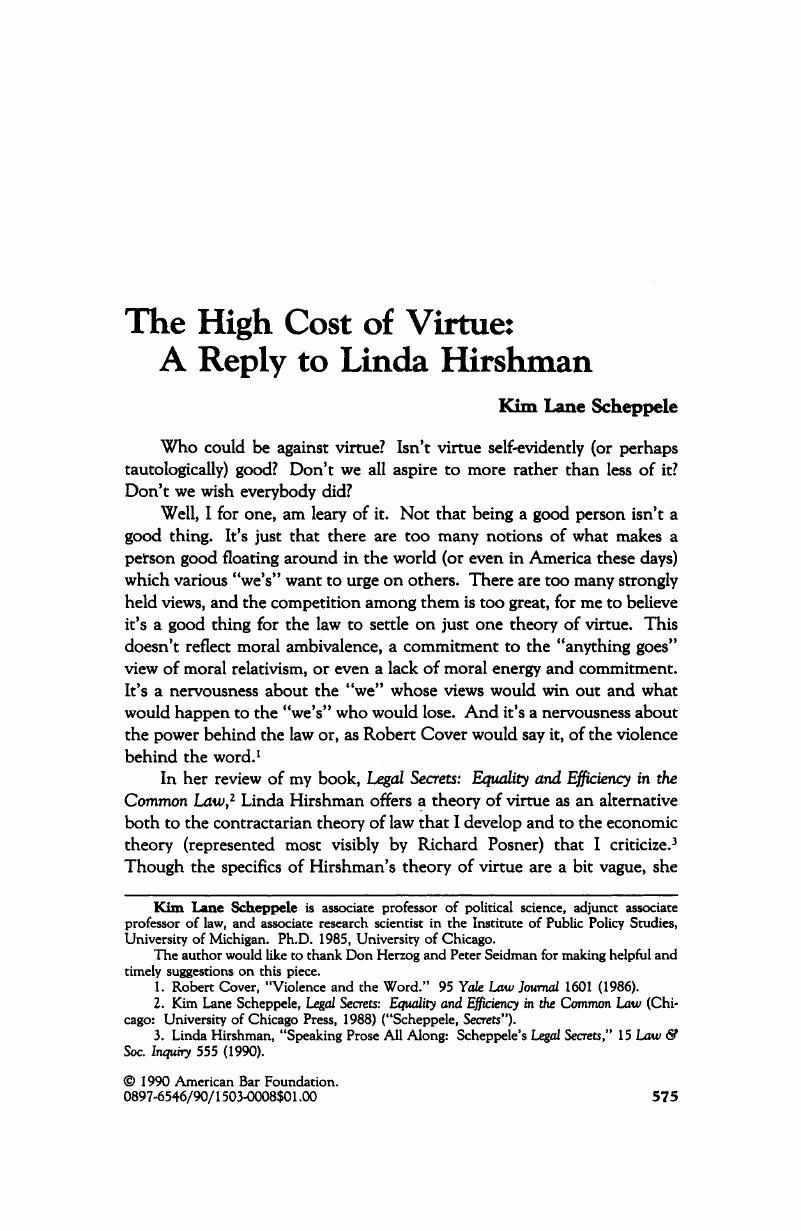Article contents
The High Cost of Virtue: A Reply to Linda Hirshman
Published online by Cambridge University Press: 27 December 2018
Abstract

- Type
- Review Essay
- Information
- Copyright
- Copyright © American Bar Foundation, 1990
References
1 Cover, Robert, “Violence and the Word.” 95 Yale Law Journal 1601 (1986).CrossRefGoogle Scholar
2 Scheppele, Kim Lane, Legal Secrets: Equality and Efficiency in the Common Law (Chicago: University of Chicago Press, 1988) (“Scheppele, Secrets”).Google Scholar
3 . Hirshman, Linda, “Speaking Prose All Along: Scheppele's Legal Secrets,” 15 Law & Soc. Inquiry 555 (1990).Google Scholar
4 . 112 Cal. App. 285, 297 P. 94 (1931).Google Scholar
5 See Scheppele, Secrets at 218–19, 248–50.Google Scholar
6 . See Hirshman, , 15 Law & Soc. Inquiry at 566–68.Google Scholar
7 See Posner, Richard, The Economics of Justice Part 3, at 260–61 (Cambridge, Mass.: harvard University Press, 1981) (“Posner, Economics”).Google Scholar
8 . 112 Cal. App. at 286.Google Scholar
9 Id. at 286.Google Scholar
10 Id. at 28–7.Google Scholar
11 Id. at 287.Google Scholar
12 . Constitution of California, art. I, 1, quoted in Melvin, 112 Cal. App. at 291.Google Scholar
13 . 112 Cal. App. at 291.Google Scholar
14 . Hirshman, , 15 Law & Soc. Inquiry at 568.Google Scholar
15 Id. at 571–72.Google Scholar
16 . 112 Cal. App. at 292 (emphasis added).Google Scholar
17 Posner, Economics at 260 (cited in note 7).Google Scholar
18 Id. at 233.Google Scholar
19 Id. at 236–238.Google Scholar
20 See chap. 13, “Comparing Economic and Contractarian Theories of Privacy,” in Scheppele, Secrets at 248–65 (cited in note 2), for a more detailed presentation of this argument, citing many more cases.Google Scholar
21 As critics of contractarianism are fond of saying: “A social contract isn't worth the paper it isn't written on”.Google Scholar
22 This is a form of negative contractarianism, which allows the thought experiment to rule out options without actually forwarding one as the right answer. At a minimum, contractarian theories may be very useful for working OUK what rules should absolutely not be allowed.Google Scholar
23 . 112 Cal. App. at 290–91.Google Scholar
24 For example, we haven't dealt with the interests of Gabrielle's friends in this. If Gabrielle were deceiving them and knowledge of her past were crucial in a real way to the maintenance of their current friendships, then there might be some basis for her friends to insist that Gabrielle disclose the information, much the same way that a prospective lover could require the disclosure of AIDS or a prospective insurer could require the disclosure of a heart condition. But Gabrielle's secret would have to threaten directly, and not speculatively or in prejudice alone, a serious interest of another, so that her withholding it did amount to fraud. In thinking about the conditions that would justify disclosure, we always have to keep in mind the harm disclosure would cause to the secret-keeper as well as the harm caused by the secret itself.Google Scholar
25 In chap. 11, “Serial Secrets,” I discuss this line of cases in more detail, making the argument that privacy claims are successful primarily when they involve unnecessary identification of the plaintiff. A commitment to contractarian analysis does not mean, however, mechanically applying the “real names shouldn't be published” rule in privacy cases. Again, different fact patterns present the opportunity to think about what parties like these will have as their competing interests in a particular case. Since the goal in contractarian analysis of the sort I propose is to think about the claims on both sides and to assess how people might resolve them in advance if they didn't know which side they were going to defend, the “real names shouldn't be published” standard developed in Melvin might be replaced by another standard if the interest forwarded against the plaintiff's were different. Sidis v. F-R. Publishing, 113 F.2d 806 (2d Cir. 1940), cert. denied, 311 U.S. 711 (1940), for example, can be distinguished from Melvin on the grounds that (1) the story would not have been news without the name, for exactly what was at issue was what had happened to this once-famous person; (2) Sidis was being identified with a praiseworthy rather than a blameworthy past; and (3) the piece was clearly a news story, rather than entertainment (as in Melvin). And the value of a free press for reporting the news can tip the balance to the defendant's side. See Scheppele. Secrets 211–22. I should note that my book indicates that Sidis apparently committed suicide after he lost his case. As a helpful letter from Professor George Christie of the Duke Law School pointed out, however, Sidis seems to have died of a stroke which resulted from his high blood pressure several years after the case was decided. Letter from George Christie, citing New York Times obituary of Sidis from 18 July 1944 and Amy Wallace, The Prodigy at 273 (1986). This makes the case somewhat less tragic, although there still are some troubling aspects. For one thing, the court assumed that Sidis consented to be interviewed for the story, but it is unclear whether the reporter who interviewed Sidis lied about her identity. If she had, the case should, in my view, have gone the other way.Google Scholar
26 . 419 U.S. –, 105 L. Ed. 2d 443 (1989).Google Scholar
27 . 105 L. Ed. 2d at 460.Google Scholar
28 Id. at 458.Google Scholar
29 Id. at 455.Google Scholar
- 1
- Cited by




